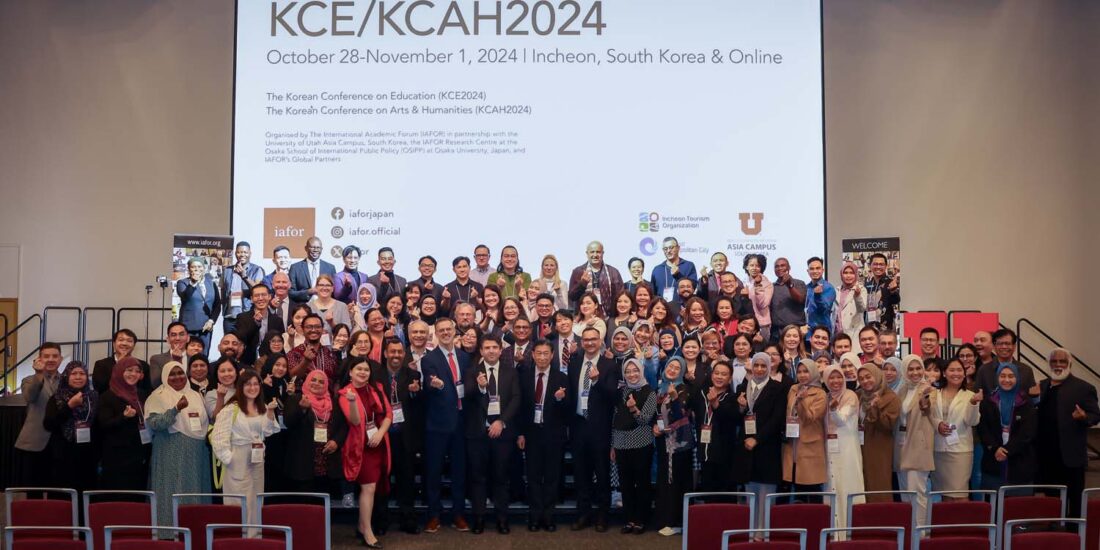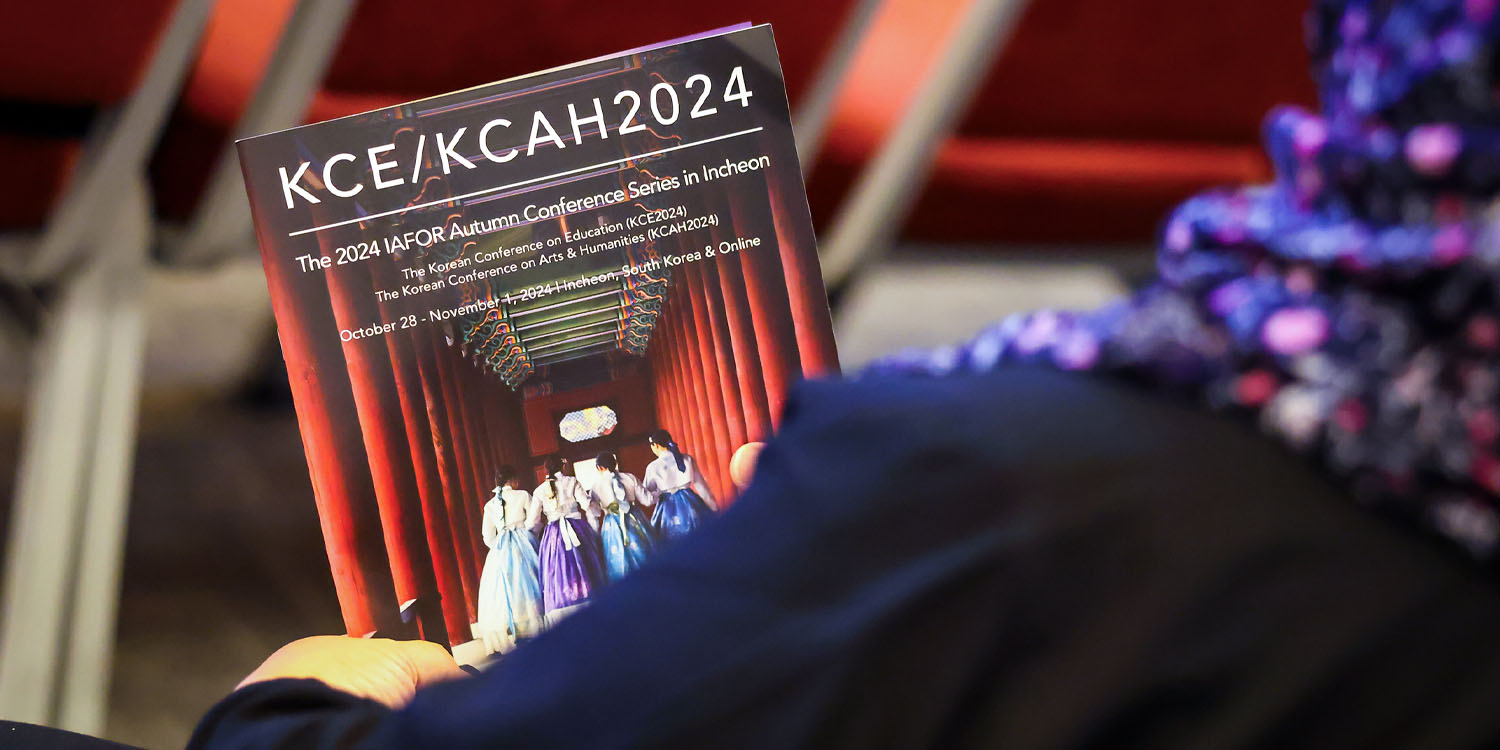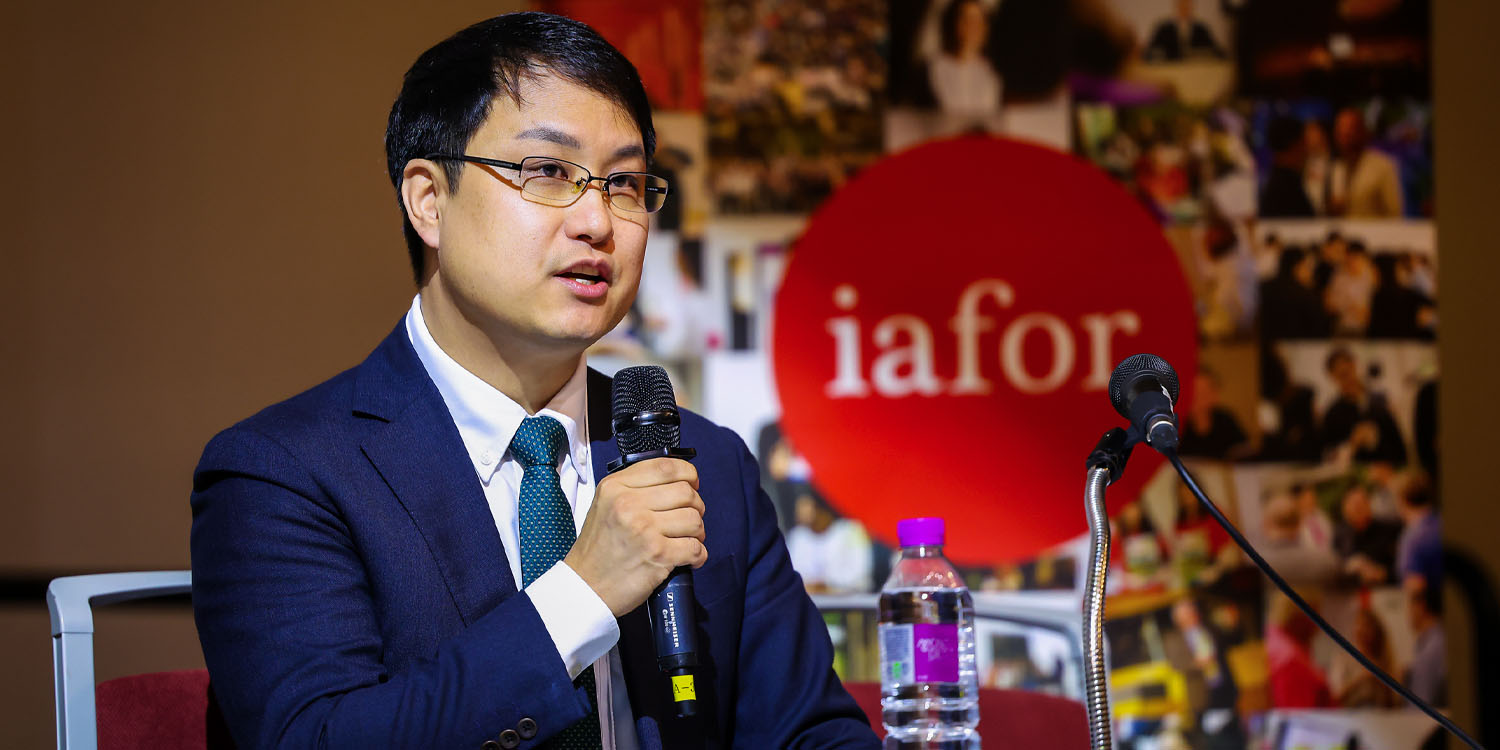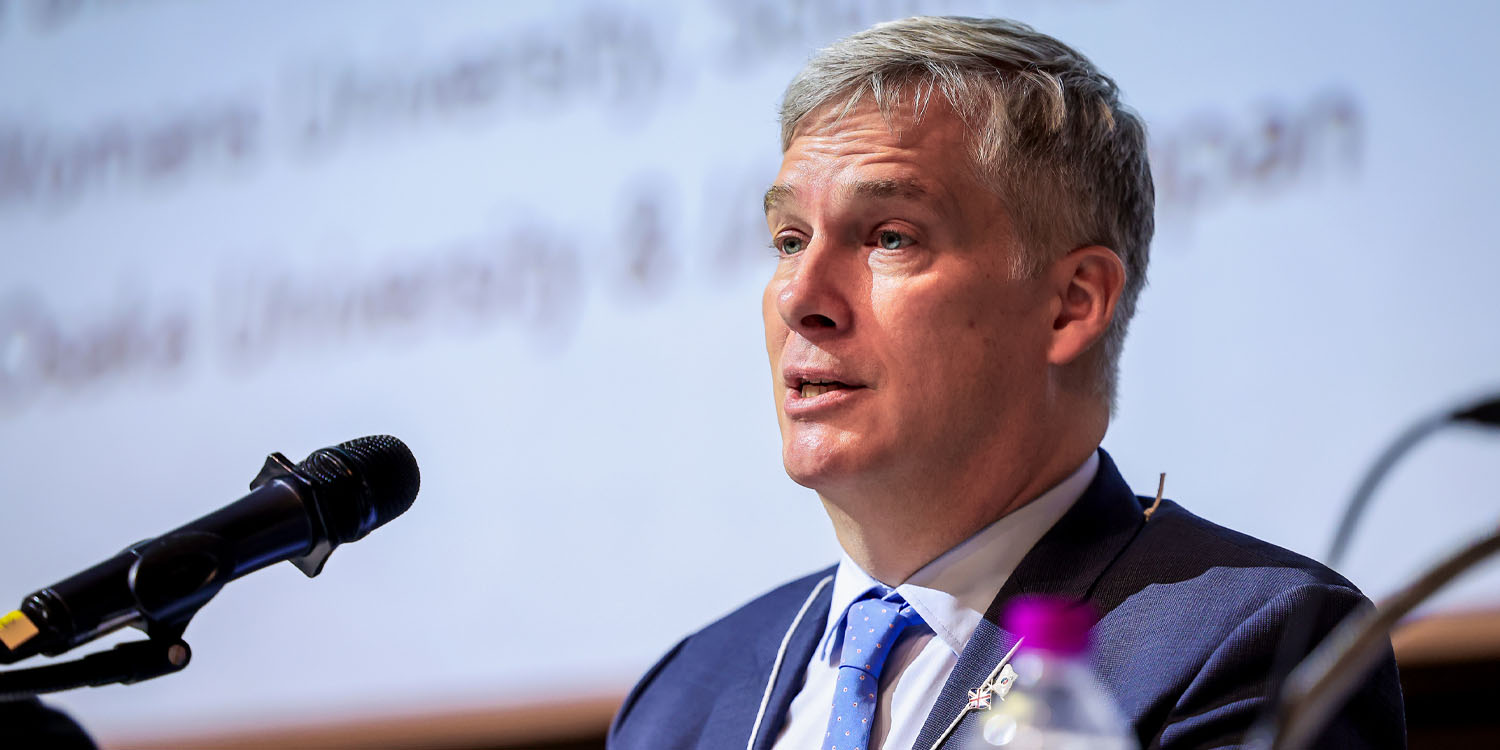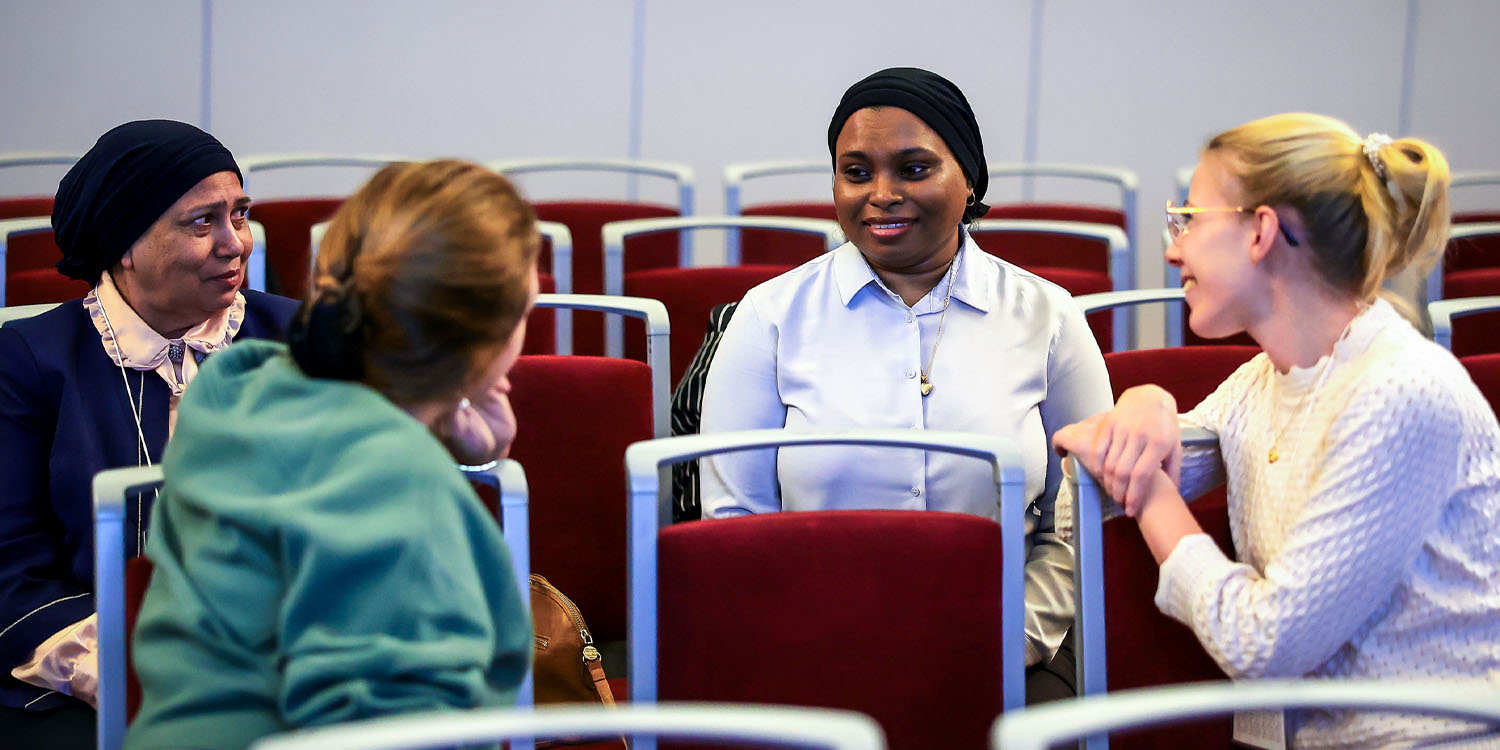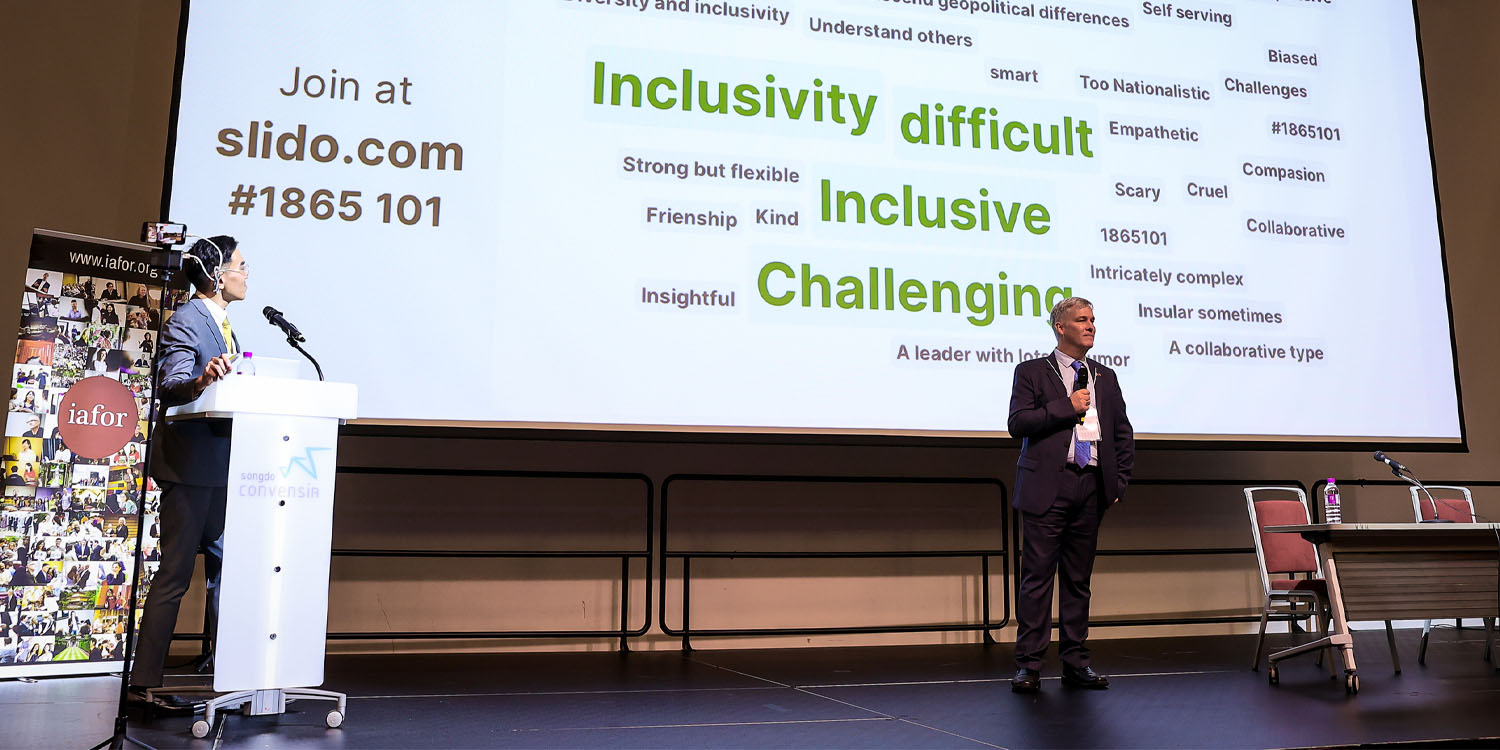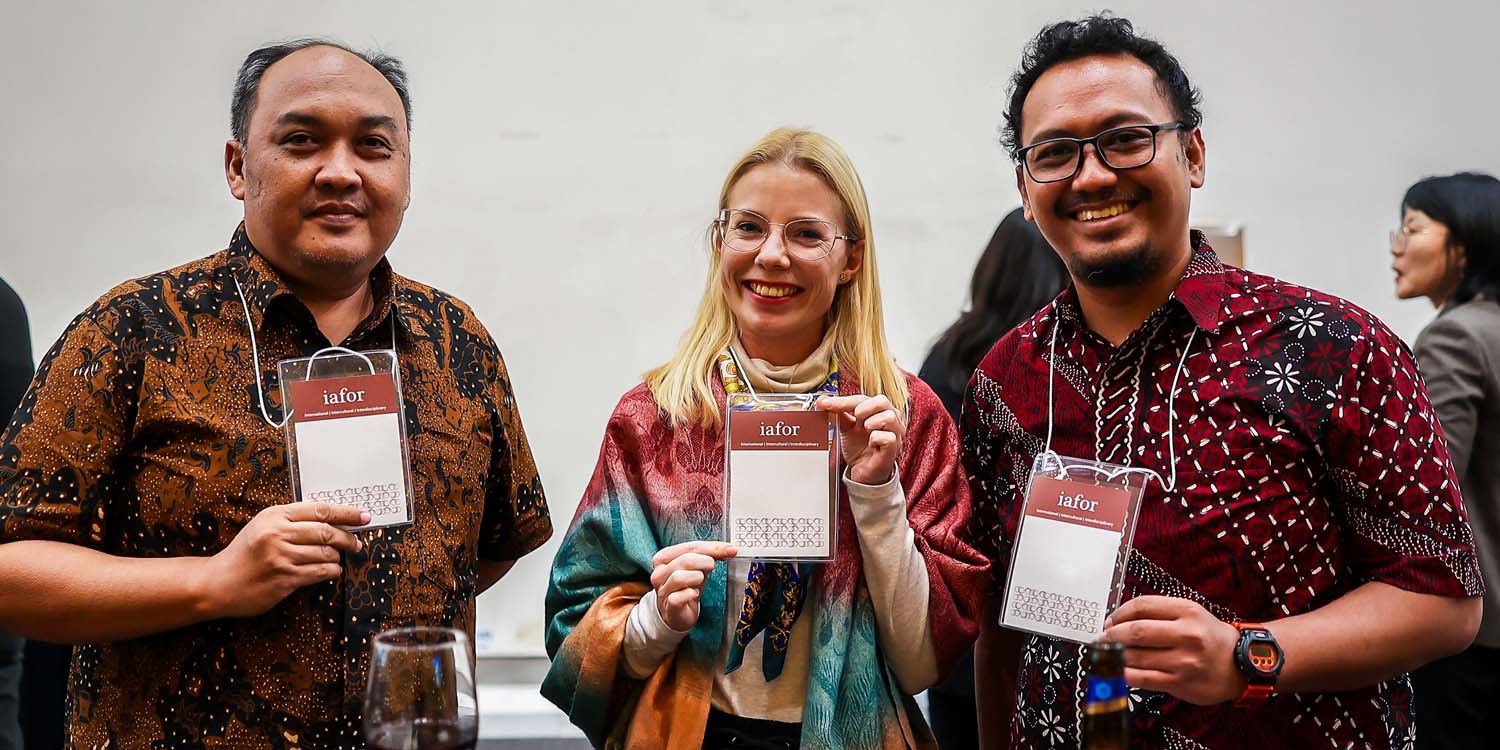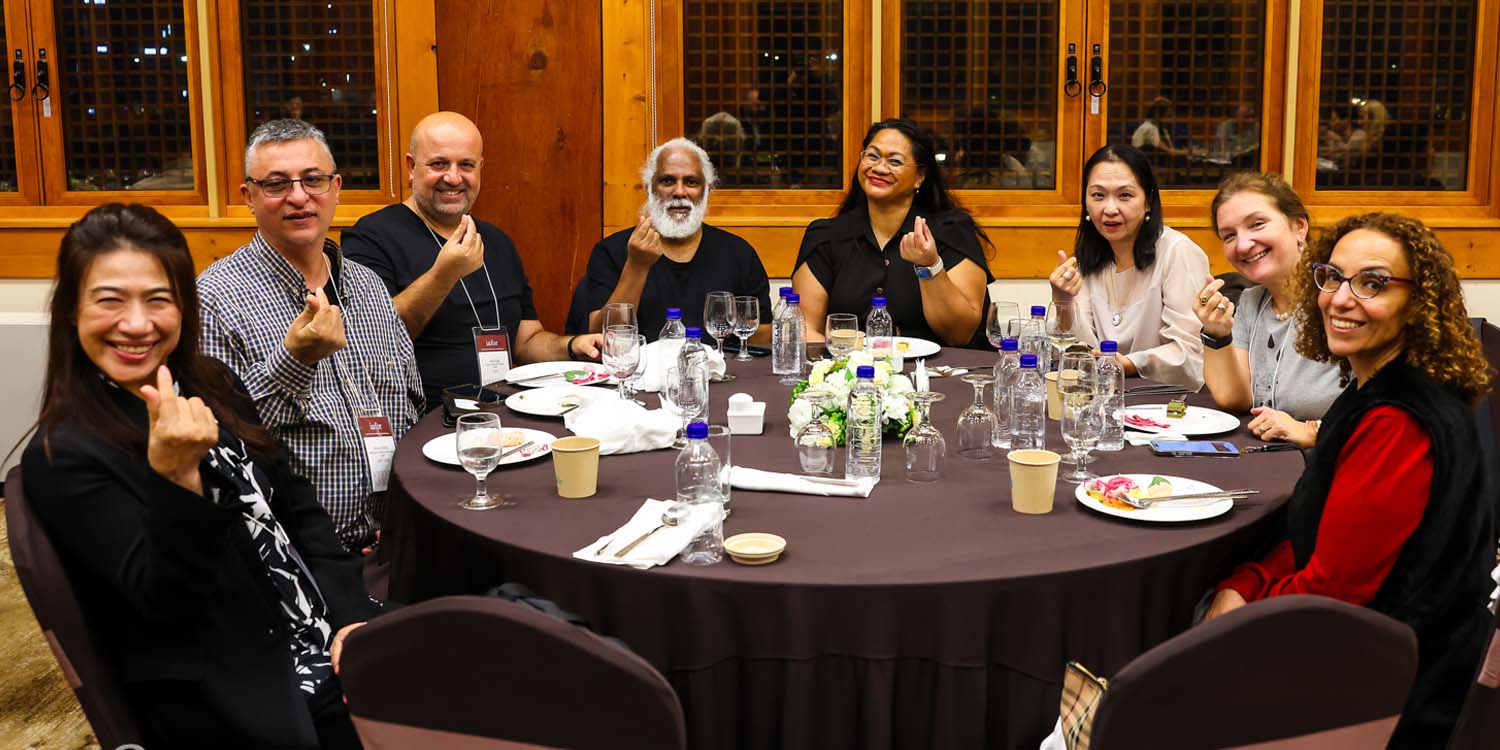The inaugural Korean Conference on Education (KCE2024) and The Korean Conference on Arts & Humanities (KCAH2024) was held in Incheon, South Korea, from October 27-November 01, 2024. The conferences welcomed over 300 delegates from 55 countries.
The conferences were hosted in partnership with Songdo International City in Incheon, the University of Utah Asia Campus, the Incheon Global Campus, and the IAFOR Research Centre at the Osaka School of International Public Policy (OSIPP) at Osaka University, Japan.
KCE/KCAH2024 examined the transformative power of education and leadership in tackling global challenges. From Global Citizenship Education to fostering inclusivity and cultural exchange, the discussions offered perspectives on building a more inclusive and sustainable society in an evolving global landscape.
Conference Report and Intelligence Briefing 2024 – Issue 7 – KCE/KCAH2024
Editor: Joseph Haldane
Authors: Apipol Sae-Tung and Briar Pelletier
Published: December 18, 2024
ISSN: 2759-4939
In partnership with: Songdo International City, the University of Utah Asia Campus, the Incheon Global Campus, and the IAFOR Research Centre at the Osaka School of International Public Policy (OSIPP)
Subscribe and Stay Informed
Receive key insights directly to your inbox.
Stay informed of the latest developments in academia.
100% free to read, download and share.
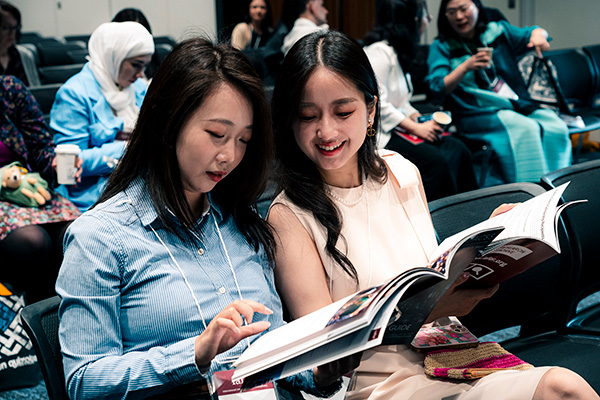
Contents
Introduction
IAFOR has landed in Korea for its inaugural Korean Conferences on Education (KCE2024) and Arts & Humanities (KCAH2024) at Songdo ConvensiA in Songdo, Republic of Korea from October 27-November 01, 2024. The conferences were hosted in partnership with Songdo International City in Incheon, the University of Utah Asia Campus, the Incheon Global Campus, and the IAFOR Research Centre at the Osaka School of International Public Policy (OSIPP) at Osaka University, Japan, in affiliation with IAFOR Global Partners. It was our honour to have The Mayor of Incheon Metropolitan City, Mr Jeong-bok Yoo, and the Commissioner of Incheon Free Economic Zone, Mr Wonsok Yun, give opening speeches. We would like to thank in particular Dr Gregory Cash Hill, Dr Hugh Schuckman, and James Jung Su Park for ensuring IAFOR landed well in Korea. IAFOR welcomed over 300 delegates from 54 countries to the conference, adding to Songdo’s international city initiative, in line with our mission of leading a forum that is ‘international, intercultural, interdisciplinary’.
The conferences’ plenary programmes were interconnected, integrating global perspectives into the Korean context. The keynotes and panel presentations highlighted the importance of global values and the role of education in tackling contemporary development challenges, both at the international and domestic levels. Ambassador Joon Oh, a former Permanent Representative of Korea to the United Nations from 2013 to 2016, Professor at Kyung Hee University, and Chair of Save the Children Korea, talked about how education has greatly contributed to Korea’s rapid development, and how the promotion of Global Citizenship Education can lead to its sustainable development. The following panel presentation featured speakers from the three main universities in the Incheon Global Campus: Dr Gregory C. Hill (The University of Utah Asia Campus, South Korea), Dr Arthur H. Lee (The State University of New York Korea, South Korea), and Dr Joshua K. Park (George Mason University Korea, South Korea). They discussed how their universities have brought international and global values into the Korean educational system and shared insights of what the future of education and universities looks like in a rapidly changing society with a declining population such as Korea.

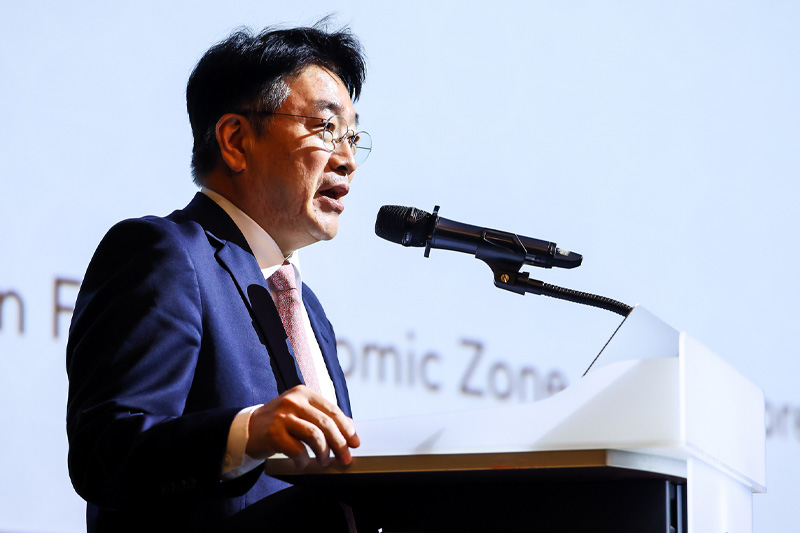
Equally important to policy recommendations and expert outlooks on Education is Leadership. Dr Joseph Haldane (IAFOR, Japan) moderated a session on Korea’s leadership, with Professor Brendan M. Howe, Dean of the Graduate School of International Studies at Ewha Womans University, South Korea) and Professor Emeritus James F. Larson (The State University of New York Korea, South Korea). The panel gave an overview of Korea’s development experience that stemmed from its strong education base, which greatly contributed to technological advancement and rapid economic growth. Despite such successful development, some challenges may jeopardise Korea’s leadership potential, including nationalism, declining population, and technological threats. The panellists, however, are positive that Korean society has the potential to lead further, due to its demonstrated resilience and willingness to embrace change. The Forum Discussion, moderated by Professor Howe and Apipol Sae-Tung (IAFOR, Japan), carried on this discussion of leadership, asking delegates to share their thoughts on ‘global leadership’ and what it entails. The discussion revealed that delegates from different national and cultural backgrounds are actively looking for ‘normative values’ in new leadership, moving away from traditional values set by national boundaries.
In looking forward to the next generation of leaders, IAFOR also brought its international undergraduate initiative, The IAFOR Undergraduate Research Symposium (IURS), to the Korean Conferences. IURS provides undergraduate students with a motivating and thought-provoking opportunity to present their research in an academic conference, offering them a supportive and collegial environment at select IAFOR Education Conferences around the world.. The symposium connected young academics from different countries and research disciplines via a poster presentation session, allowing them to develop professional skills and connect with each other and seasoned academics alike.
During the conference programme, IAFOR was able to deliver several cultural events and networking opportunities for delegates. From the cultural and educational tours of the historic Ganghwa Island and Incheon Global Campus to a visit to the National Museum of World Writing Systems, delegates had a chance to experience what Korea has to offer in its culture, history, and education heritage. The tours broadened their knowledge about Korea and offered opportunities for delegates to develop and create meaningful connections with their peers. June Han Sunim, a practising Buddhist monk and co-founder of JustBe Temple, in Seoul, offered a meditation workshop, offering personal insights into meditation practises and how it can help with daily pursuits, including academic life. The session was well received and delegates were able to have personal sessions to discuss meditation in a more in-depth capacity.
Plenary programmes as well as cultural events are designed to promote international exchange, facilitate intercultural awareness, encourage interdisciplinary discussion, and generate and share new knowledge. In turn, presentations, conversations, and input by our delegates have informed our upcoming Conference Themes for 2025-2029: Technology and Artificial Intelligence, Humanity and Human Intelligence, Global Citizenship and Education for Peace, and Leadership. These themes directly correspond with what IAFOR and its members view as the pressing issues that should be discussed at the conference. In addition to what is being presented on the plenary programme, IAFOR also does exclusive interviews with plenary programme speakers to provide more insights into what has been discussed at the conference and beyond. We have incorporated some parts of the interview into this conference report, and the full interview can be accessed across IAFOR social media platforms.
The following sections of the report begin with Korea’s development experience and factors contributing to its rapid economic growth, including the role of education in Ambassador Oh’s presentation ‘Global Citizenship Education for Sustainable Development: Korea’s Perspective’. This is followed by an analysis of what Korea’s educational landscape looks like today and its future outlook in the panel presentation ‘Navigating Global Campus Management: Challenges and Innovations’ by Dr Hill, Dr Lee, and Dr Park. After examining the role of educational development in terms of policy, the report shifts to leadership as a potential driver of policy: Professor Howe and Professor Larson’s panel on ‘Korea’s Pivotal Role in the World: Challenges and Opportunities in Leadership’ discusses domestic leadership from Korea’s experience, its limitations and potential in leadership. The Forum Discussion ‘Global Leadership in a Fragmenting World’ section explores this potential further, analysing IAFOR delegates’ discussions and expectations of leadership at the global level during The Forum session. Finally, the role of language in global citizenship education is addressed in Professor Jennifer Andrus’ presentation ‘A Translingual Approach to Language Ideologies and World Englishes’, an example of how we can ‘dissolve’ one-truth and single language identities to become more understanding and open-minded, essential for our becoming global citizens and potentially global leaders.
2. Global Citizenship Education for Sustainable Development: Korea’s Perspective
The world witnessed the East Asian Miracle in the 1980s, when countries in East Asia experienced dramatic economic growth. The Republic of Korea was one of those countries and remains a major player in today’s global economy. What makes a country with a GDP per capita of $158 in 1960 grow to $33,121 in 2023? In his keynote presentation ‘Global Citizenship Education for Sustainable Development: Korea’s Perspective,’ Ambassador Oh, drawing upon his experience as a former diplomat and representative to the United Nations, unpacked Korea’s development experience and highlighted the importance of education as the main contributing factor to Korea’s strong development.
Korea’s development ideology is rooted in the drive to progress rather than waiting for every element to be ‘ready’. Ambassador Oh illustrated this through a story of two towns: Town A represented a struggle in daily life, and Town B projected an image of a city bustling with wealth and investments. The two towns were vivid in his example, as his storytelling came from personal retelling: the two towns were two incarnations of the town he himself lived and grew up in. ‘In fact, my life so far has been divided roughly in half between these two towns. I did not move, but the town transformed itself from A to B’, Ambassador Oh said, highlighting Korea’s drastic development within the span of a generation. Ambassador Oh emphasised that the pursuit of development is driven by humanity’s desire to overcome extreme poverty, to achieve economic and social development in a sustainable environment. ‘...It is more difficult to be happy with an empty stomach. It is not easy to be thankful to society when our children are sick and there is not much we can do about it,’ he explained.
2.1. Is Our World Sustainable?
As humanity strives for development and exploits the world for it, Ambassador Oh posed another question: Is our world sustainable? The increased use of fossil fuels since the 1950s has contributed to the rise in global carbon emissions. At the individual level, Ambassador Oh pointed out how personal behaviour, such as overconsumption of livestock, leads to higher levels of biomass. Relative activities, such as the monoculture of corn for excessive animal feedings and the international trade of such feed and meat products, are also contributing factors to global warming.
Ambassador Oh suggested that a stronger and more effective global governance is required to tackle these environmental issues. To him, the world has realised the importance of sustainable development for a long time but has yet to effectively respond to it, bound by ‘narrow national interests’. Ambassador Oh quoted the definition of Sustainable Development from The Brundtland Report (1987), also known as Our Common Future, that sustainable development is development that ‘meets the needs of the present without compromising the ability of future generations to meet their own needs’. Development has progressed since then, but only recently has the international community realised the importance of sustainable development. The 17 Sustainable Development Goals were adopted in September 2015 by The United Nations, followed by the breakthrough of the Paris Agreement at COP21 in December 2015. However, he viewed that the current commitment of each country is still short of delivering said commitments. Even in 2024, the Summit of the Future at the UN in September yielded no significant outcome, as there was minimal advocacy and countries have done little research on sustainable development issues as they are ‘sensitive issues’ that might affect national interests.
In the follow-up interview, Ambassador Oh cited the recent meeting between the UN Secretary-General António Guterres and the High Commissioners when stating that only 17% of the SDGs' progress is on track. We need more efforts, climate action, and more peace.
The lack of progress is explained by several factors, including the ongoing armed conflicts, and the pandemic that lasts for two years. We need to stop the diversion of resources to the other things which should have been used on the implementation of the SDGs.
SDGs, to Ambassador Oh, can be the platform for shared interests, for nations to overcome ‘narrow national interests’. He urged us to ‘think and act accordingly’, to consider what will happen to planet Earth in the next 20-30 years, including the future of humanity. He accentuated the importance of collective action of the people to urge their politicians and leaders to take more action themselves in working together rather than fighting with one another.
2.2. Global Citizenship Education as the Solution
In response to the lack of effective global governance, Ambassador Oh proposed Global Citizenship Education as a solution to sustainable development. In addition to being a national citizen, he urged everybody to think of our identity beyond national borders. How to nurture global citizenship, he argued, is the ‘common task for humanity’. Quoting Former UN Secretary-General Ban Ki-Moon, global citizenship education is ‘more than literacy and numeracy. It is also about citizenry…helping people to forge more just, peaceful and tolerant societies’. The core of global citizenship, to Ambassador Oh, is how one learns to ‘expand identities’ from a member of a family, community, state, or nation, to become a global citizen beyond borders. He proposed two main pillars of Global Citizenship Education: Universal Values and Respect for Diversity. While there are conflicts that occur between universal values and diversity, Ambassador Oh urged us and humanity in general to use our collective wisdom in settling what universal values and diversity are.
Ambassador Oh proposed that one way to promote Global Citizenship Education is to focus on specific issues such as climate change. Educators should raise awareness for youth to recognise the criticality of the issue. Politicians also play an important role in shaping what is being discussed in society, but they would rather focus on winning the election than what will happen to the earth in the next twenty years. Civil society organisations could also pressure politicians to become more proactive in these issues. With the collaboration of all sectors in society, we can advance global citizenship education and the role it plays in sustainable development. Ambassador Oh also pointed to politicians and media as having the responsibility to address these issues more appropriately.
‘Global Citizenship Education is a very powerful tool to build a more peaceful, just, and sustainable world in the future’, said Ambassador Oh in a follow-up interview. He proposed that the promotion of worldwide Global Citizenship Education will encourage people to develop a more rounded understanding of what is going on globally and what they need to do to address global challenges.
In terms of Korea's development experience, Ambassador Oh touched on how education plays an important role in transforming the nation from a recipient to a donor country within a generation. Compared to more than half of the African countries with a GDP of over $100 per capita in the 1960s, Korea’s GDP was less than $100. However, an over 90% primary school enrollment rate may be what brought Korea to where it is today, Ambassador Oh argued. In his follow-up interview with IAFOR, Ambassador Oh also remarked on how Korea is ‘paying back’ to wider society by working together with international organisations such as UNESCO to promote education efforts. This can provide development experience to developing countries through education, working together to achieve sustainable development goals.
‘We should have more identity as a global citizen in addition to being a national citizen’, said Ambassador Oh in his message to the younger generation. All of us are living in the transitioning, globalised, and interconnected world. Ambassador Oh urged us to overcome the boundary of national identity, to think about global issues, and to act together to address global challenges. Unless we work together, Ambassador Oh pointed out, ‘I think the future of humanity will be at great risk’.
3. Navigating Global Campus Management: Challenges and Innovations
As Ambassador Oh identified education playing an important role in Korea’s development experience, education has become one of the sectors in which Korea is striving to improve to build its future. The panel presentation on ‘Navigating Global Campus Management: Challenges and Innovations’ addressed the current success, challenges, and future perspectives in enhancing Korea’s education landscape. Through the Incheon Global Campus (IGC), five premier universities and research institutions from Europe and the United States are situated together in Songdo, Incheon, Korea, as a collaborative campus. The IGC has created opportunities for Korean and international students to engage in classes taught in English. This panel was joined by Dr Gregory C. Hill, Chief Administrative Officer and Dean of Faculty at The University of Utah Asia Campus Dr Arthur H. Lee, President of the State University of New York, Korea (SUNY Korea); Dr Joshua K. Park, Campus Dean of George Mason University Korea (Mason Korea); and moderated by Professor Hugh Schuckman, Associate Professor at The University of Utah Asia Campus.
3.1. Adding Values to Korean Education
Professor Schuckman began by asking the first question to the panel: What is the educational value your university brings to the Korean context? How did each university add educational value to Korean and international students? This initial question posed to the panellists addressed the contribution of foreign universities to Korean higher education. The question allowed us to see what each university is aiming to achieve, and what they have achieved so far.
Dr Lee began by pointing out that the goal of the ‘Global Campus University Project’, or the IGC, was to provide opportunities for Korean students to acquire degrees from foreign higher education institutions while remaining in Korea, inviting ‘healthy’ competition to the Korean educational landscape. SUNY Korea joined in Spring of 2012 and has been working closely with the Korean government in spearheading the establishment of rules, policies, and regulations that are necessary for the survival of foreign higher education institutions in Korea. Adding to the global perspective, Dr Hill highlighted the core value of global citizenship that The University of Utah Asia Campus has brought to the students. Besides the importance of collaboration between the universities within the IGC that supports the students’ needs, it is important for students to experience the world beyond the campus. The University of Utah adheres to the concept of ‘One U’ – where students in the Asia Campus and Salt Lake City campus can benefit from their interactions throughout the curriculum. Similarly, Dr Park also highlighted the importance of global citizenship through the ‘Two Nations One Mason’ programme at Mason Korea, bringing its popular programme from the home campus to Korea, which could be beneficial to the Korean higher education as a whole. The Korean campus brings an American perspective on these aspects into Korea’s education system, for its students to learn how Korea could function economically and politically within its geopolitical landscape, and how Korea can advance and provide lessons to other Asian countries.
3.2. American and Korean Cultures Merged
Following the responses from the panellists that highlighted the global, international value their universities bring to Korean campuses, specifically the ‘American Value’. Professor Schuckman asked the panellists to address the ‘challenges of straddling two educational cultures’ and how each university deals with the differences in educational cultures and values.
In addressing the cultural challenges of the Global Campus, Dr Park quoted George Mason University’s slogan: ‘All Together Different’. He mentioned that we often think of putting different cultures together as a ‘melting pot’, but the reality of it is quite different. The importance is not so much as what ‘melting pot’ theory is, but more of a ‘bibimbap’ theory, mimicking a famous Korean rice bowl dish garnished with various toppings: where people of multicultural and multinational backgrounds are not ‘melted’ into one, but rather co-exist and are able to maintain some of their diverse identities: when identities are mixed but their core remains. Dr Hill added that the challenge besides attracting international students is how to integrate them, both inside and outside of the classroom. For the Utah Asia Campus, cultural integration is one of the biggest challenges: English is the lingua franca within the campus, but students from different countries speak in their own languages, which are often associated with their cultural identities. What Dr Hill viewed as important is the creation of a ‘common identity’ among the students at the Utah Asia Campus, for students of different backgrounds to co-exist in the space they share both inside and outside the classroom and to recognise and respect cultural and language diversity. In a follow-up interview, Dr Hill highlighted the vision of the Utah Asia Campus as a ‘cultural hub’ in joining the IGC. He stated that it gives students the global experience that they could not get at home, and that universities that are not engaging in such practises of globalisation will fall behind.
In terms of education, the concepts of American and Korean education are rather different. Korean education is delivered in a more traditional lecture style, whereas American education puts more emphasis on critical thinking and creativity. What Mason Korea views as a challenge is how to accommodate Korean students from their structured education background together with students from over 20 countries of different religious, cultural, and educational backgrounds. Korean schools are more geared towards uniformity, as it is ‘easier’ to manage and prone to fewer conflicts. Dr Park encouraged us to overcome the idea of ‘conflicts in diversity’ as ideas from people with different backgrounds will bring out the best innovation and outcomes, although sometimes in a disruptive and uncomfortable manner. Dr Lee agreed with Dr Park that Korean classrooms, either at a traditional Korean university or at SUNY Korea, are rather quiet since the majority of the students are Korean. Not only is the teaching culture different, but Dr Lee also pointed out that the Korean education culture in general is different, in which students put all their efforts towards university entrance examinations, with their admission to the university being the highest achievement. Hence, culturally, ‘taking it easy’ in the freshman year is their reward. SUNY Korea responds to this issue by arranging the best instructors to teach the classes for all new admissions and bringing international students into the classroom. International students have different characteristics, but they are proactively participating in the classroom, which Dr Lee viewed as motivation for a change in Korean students and Korean educational culture.
3.3. Future of the Global Campus: How Will Universities Grow Sustainably?
The final part of the panel addressed the ‘Future of the Global Campus’ from different perspectives. As the panellists have discussed the ‘international values’ and the integration of international students into the campuses, they turned their focus on the question of what these campuses can do in order for the university to ‘survive’ the current declining population in Korea and the new challenges the next generation will bring.
Dr Hill began by addressing two key factors: the fast-paced changes in the educational landscape and the decline of college-age students. To ‘imagine’ the university in the future is challenging, but what he viewed as important is how to be ‘globally competitive’. He raised an example of how Artificial Intelligence (AI), a factor beyond the university’s control, is affecting educational institutions, and how they should respond to it. He proposed that university and faculty members should be ready to embrace AI as a part of their curriculum and pedagogy. The Career and Internship Development team at the universities should be more proactive in preparing students to be equipped with the necessary skills to integrate AI into what they do to become market-ready after their graduation. In addition, Dr Park pointed to internationalisation and Industrial 4.0 – The Fourth Industrial Revolution – as Mason Korea’s path to the future, noting that universities should become more competitive with the current influx of online courses offered by big companies such as Google or Apple. Universities should be able to offer ‘stackable’ micro degrees for students to maintain relevance in their industry, aside from what they are studying.
The strong point of university, Dr Park pointed out, is that it is a place where the in-person intercultural exchange takes place that is distinct and cannot be achieved through a metaverse. Dr Lee noted that while AI will become increasingly important, it will not change the core structure of the university. According to him, a significant change will be in how universities interact with the students, as their way of life will significantly change in the near future. Furthermore, the challenge for universities within the IGC is how to attract students. Since Korea has a declining population and low birth rates, the university cannot rely on Korean students alone: it also needs to bring in international students to maintain a robust student body. Dr Park proposed that the major obstacle to bringing international students in lies in the ‘hesitancy’ and ‘barrier’ put up by the Korean government with unclear directions or positions. In a follow-up interview, Dr Park stated that international students have the potential to address Korea’s population issue. They can become a skilled person with global mindsets and global experience, some of whom eventually settle down and remain in Korea, subsequently bringing an international perspective and globalised skill sets into Korean industries and society.
4. Korea’s Pivotal Role in the World: Challenges and Opportunities in Leadership
Outlining Korea’s remarkable developmental experience in its economic and technological advancement as well as its particular focus on education, the previous panel dangled a question of whether Korea can use these sectors to become a global leader. To answer this question, the panel on ‘Korea’s Pivotal Role in the World: Challenges and Opportunities in Leadership’ looked at what could be seen as challenges and opportunities for Korea’s leadership in the world. The panel tied in with IAFOR’s Conference Themes for 2025-2029, which are Humanity and Human Intelligence, Technology and Artificial Intelligence, Peace Education and Global Citizenship, and Leadership. The panel was joined by Professor James F. Larson (SUNY Korea, South Korea) and Professor Brendan M. Howe (Ewha Womans University, South Korea), and was moderated by Dr Joseph Haldane (IAFOR, Japan).
South Korea has been considered the quintessential contemporary ‘Middle Power,’ with a great window of opportunity to advance through its ‘niche diplomacy’ and become an influential pivot state while addressing pressing global issues. However, South Korea also faces significant challenges which jeopardise its leadership potential. Divided since the end of the Second World War, the security threat posed by North Korea continues to loom over the country. With the lowest birth and replacement rate in the world, an ageing population, a highly demanding education system, and one of the highest suicide rates, its society’s well-being is severely threatened as well. In light of the transitioning global landscape and South Korea’s unique background, Dr Haldane posed the first question to the panellists that set off the discussion: What kind of leadership do we need today?
4.1. What Kind of Leadership Do We Need Today?
Professor Larson began by raising the example of Korea’s rapid development in the post-war period, especially in terms of telecommunications and technological advancement. He viewed the traditional technocratic leadership, which consists of the government, the technology industry, and academics who are technically trained as the key to Korea’s successful development. Professor Howe stated that the technocratic structure has led to tremendous economic growth, but it is also essential to look at what kind of leadership we need going forward. The main challenge is the traditional development that focuses on state development and security, which compromises individual security, human security, and the security of the vulnerable, as well as the wider global stage and the biosphere. For example, Korea turned its attention to this issue by setting up and funding the Global Green Growth Institute to examine the impact of the Anthropocene Era.
The kind of leader we need, Professor Howe argued, is a global leader. Global leaders are those who are aware of global issues, care for the next generation, and move beyond national borders and parochialism. He stated that what Korea has done well is development through education: Korea is successful in educating the next generation of leaders in their ability to identify what is needed at each step of the development process. Korea quickly transitioned from a developing country into a developed country and is now a major donor of international aid. In terms of education, the Korean government set up nine international studies graduate schools in 1997, including Ewha Womans University and Yonsei University, with the purpose of internationalising and providing education for the next generation of leaders. What worries Professor Howe is how the current global geopolitical issues are moving back towards parochialism, when the way to deal with global issues is to foster an international and global mindset instead. The education field can contribute to this issue by internationalising and promoting global awareness, keeping in mind the inclusivity of the vulnerable and the negative impact development has on them.
4.2. In Which Area Does Korea Lead Well?
Dr Haldane continued the panel discussion by laying the groundwork for how those outside of Korea see Korea through big corporate names and pop culture, such as K-dramas and K-Pop bands, as the projection of the Korean government. He asked the panellists, as long-time residents of Korea, to share insights from the insiders’ perspective on which area Korea has led well.
Professor Larson responded in support of what Professor Howe touched upon earlier – that Korea did well in development through education. Even during political turmoil present in the 1980s, Korea still managed to train its citizens alongside technological development to familiarise its people with technology and learn how to both use and develop it.
Professor Howe stated that there are two considerations when talking about leading well: efficient and normative consideration and value-based consideration. Professor Howe began by referencing Professor Larson’s example of how Korea is efficient, and that it is indeed a miracle that Korea has achieved high development amidst a conflict-affected society, which is technically still at war with North Korea. In addition to being efficient, Professor Howe discussed Korea’s normative leadership. In other words, how can other countries follow Korea’s lead? Korean government spending on education is among the highest in the world, but besides this government effort is the ‘citizenry’ of Korea, Professor Howe argued. Koreans are equipped with social awareness, and this is reflected on many occasions, including being the nation with the second largest number of volunteers for overseas volunteer programmes in the world, second only to the United States Peace Corps. During the COVID-19 pandemic, it was the people’s willingness to respond to the government policies that contributed to Korea overcoming the devastating pandemic quickly. This citizenry, Professor Howe argued, is the explanation of how Korea can successfully develop its soft power, cultural diplomacy, and technological efficiency.
In the follow-up interview, Professor Howe gave an example of how Korea is a major leader in the world in terms of economic performance, communication technology, military strength, and number of overseas volunteers. However, geographical limitations restrict what Korea can do. The main focus has been the existential threat of North Korea and how they are ‘trapped’ between US-China relations. Instead, Professor Howe proposed the improvement of ‘niche diplomacy’, where the Middle Powers that do not have the resources to have an impact on all aspects of diplomacy shift their focus to making a greater impact on a particular ‘niche’ area. Furthermore, Professor Howe noted that Korea has the potential as a ‘supercharged middle power’ to lead region-focused ‘minilateral cooperations’ that focus on non-traditional security issues. This will lead to a golden opportunity for these second-tier power countries to gain what they need for their national interests and simultaneously contribute to the global commons.
4.3. What Challenges Korea’s Leadership?
As the panellists have made clear that education is incredibly important to Korea’s development, Dr Haldane asked the panellists to share the challenges within the Korean education system and how that should be addressed within the Korean context.
Professor Larson began by stressing that education is the fundamental process of the world we are living in now: The Information Age. Korea leads well in education in that it provides for R&D education for its citizens. However, the challenges to Korea’s leadership lie within Korean society itself. Professor Larson pointed to the need to address technological threats, such as Generative AI and deepfake technologies that are already causing harm to society, citing the recent Telegram scandal in Korea. In addition, Professor Howe also pointed out the need for a change in the current society, in which the younger generation is deeply unhappy as a result of ‘hyper-competition’ and high standards that are set and must be met. This has led to high suicide rates from a fear of failure to meet these standards and the feeling that one must remove oneself from society if one were to fail. However, Professor Howe was positive that Korean society is resilient and caring, and that it has a willingness to change and adapt.
In terms of education, Professor Howe highlighted the challenges of attracting and supporting international students in Korean education and policy. Given that Korea is facing a ‘demographic time bomb’ by having the lowest birth rate in the world, the education ecosystem, including the border society, will need to rely on international students to sustain itself. Korea is attractive for international students, but Korea also makes it hard for them to stay in the country. Professor Howe proposed that Korea should be more open in terms of immigration. The government needs to realise the reality of a shrinking population that will result in fewer contributing members of the society to fund pensions for the larger older population. Additionally, there is also a negative impact of nationalism. This has led to international students being denied a stay after their graduation.
In response to the negative point raised, a delegate in the audience asked whether these challenges had been communicated to the Korean Ministry of Education (KMOE). Professor Howe responded that KMOE is micromanaging universities, so universities have less autonomy. Historically, KMOE has been quite good in addressing what needs to be changed in Korean education to fit the needs of Korean society. Professor Howe gave a personal example of his early teaching career when foreign faculty were getting paid less for teaching more classes than Korean faculty members. With the vision of the Dean and Associate Dean at the time, faculty advocated for the policy change at Ewha Womans University for foreign faculty to be appointed under the same contract as Korean faculty, and this set an example for other universities to follow. That being said, Professor Howe hoped that the change in policies regarding international students would be a positive one. This reflects what he cited at the beginning of the panel discussion that the motto ‘Dynamic Korea’ is what inspires him to be in Korea, in a society that is willing to embrace change.
5. The Forum: Global Leadership in a Fragmenting World
Following the panel discussion on Korea’s leadership, the Forum discussion invited delegates to share their own perspectives on Global Leadership. The Forum was moderated by Professor Howe and Apipol Sae-Tung (IAFOR, Japan). The moderators asked the delegates to look into the future and reflect on the current world’s leadership. To begin the discussion, delegates were asked to share their thoughts on what ‘new’ global leadership looks like, despite the so-called ‘failure’ of current global leaders in addressing contemporary issues. The delegates were asked to share their responses anonymously through a word cloud, and they were invited to elaborate on their responses.
5.1. ‘New’ Global Leadership?
The responses from the delegates displayed a mix of two trends: the challenges the respondents see in current leadership and the ‘optimistic’ side of leadership, or in other words, what the respondents want to see in leadership. The responses were interesting in that we can see not the universal perspective on leadership, but the overlapping normative consensus, e.g. those looking at challenges responded with ‘difficult’, ‘too nationalistic’, ‘competitive’ keywords whereas those looking at the opportunities or what they expect from new leadership responded with ‘multicultural approach’, ‘inclusive’, ‘distributed leadership’, ‘genuine’, ‘respectful’, ’compassion’, and ’empathetic’ keywords. Among the responses, ‘inclusive’ and ‘difficult’ were the most common.
A delegate from the Philippines found future leadership challenging because of two factors: different generations and technological advancement. In this digital world, we have the ‘digital native’ and ‘digital immigrant’ and the influence of AI could affect these people. She proposed that it is important for leadership to manage this challenge for us to survive.
Considering the ‘inclusive’ response, this shows that the respondents want the future leadership to be encompassing and representing everybody. A delegate from Iran shared her response on multiculturalism and inclusivity:
If global leadership could happen, [as the world is] including different cultures, a multicultural approach is needed for the leader to understand different cultures. The recognition of cultures brings peace and coexistence for all of us together, in a better world.
In response to that, Professor Howe added that this also related to one of the responses: ‘hegemonic’. Since Bretton Woods, the world has been under US hegemony, which does not embrace competing perspectives, but there came a time when the US hegemony was absent during the Trump administration. The real question is who will provide leadership in the US’ stead?
On the question of whether nations can overcome their nationalist barriers, Professor Howe responded that we have the ‘middle powers’ who attempt to convey a ‘universal approach’ through international commissions. However, they have failed to take relativity and different perspectives into account. For example, we never have a universal consensus on universal human rights, but can instead agree on overlapping universal ‘human wrongs’. What Professor Howe urged us to look at is the competing epistemological and geographical traditions to what we can agree on. In other words, it should be a bottom-up approach to leadership rather than a top-down hegemonic approach.
5.2. Defining Global Leaders
The second question asked delegates to share their definition of a ‘global leader’, in addition to what they had shared earlier about ‘new’ global leadership. The responses showed that the respondents are looking at the normative aspect of leadership rather than effective leadership, or the so-called Machiavellian definition of good leadership. Traditionally, we tend to think of good leaders as those who can drive things forward. These responses go in different directions and are looking into a much more nuanced and normative leadership. It is not the question of what makes an effective global leader, but what makes a normatively good global leader.
Among the responses, ‘open-minded’, ‘adaptive’, and ‘diplomatic’ were the most common keywords. Delegates were active in sharing their thoughts on being an open-minded and adaptive leader:
I wrote open-minded because I think it’s very important for global leaders to learn from other people, to be ready to learn, to be curious,... to cope with all nations and all citizens, [to] not focus only your own culture, [but also] consider other cultures’ needs, a nation’s needs, especially the small ones.
I put open-minded and adaptive, plus the strongman, a man or a woman. … One of the facets of globalisation is a fast-paced changing system. For me, to be adaptive is not just culturally, but also with the system as well as the weather, the global changes… that is why a global leader for me should be adaptive before he can actually act on something.
Another delegate raised the importance of humility and self-awareness in a successful global leader:
With humility, I think there is a certain self-awareness that comes into play, and you are more aware of other people when you are being humble because you don’t place your understanding and your prior skills and knowledge on a pedestal, and so you are able to meet people where they are. I think that is a very strong, and a very empathetic and kind leader who is humble and very empathetic, the value that we don’t talk a lot about.
5.3. Becoming Global Leaders
In the follow-up question, delegates were asked to reflect on their own country and what their country can do to become the global leader that they had defined and hoped for. The responses focused on non-traditional elements of leadership. Instead of increasing military might or the development of the next wave of technological innovation, the responses predominantly focused on social aspects, which correspond directly with the global citizenship theme.
The main concern for the respondents was the level of corruption in their country. Professor Howe raised an example that South Korea also has its own transparency issue and houses an androcentric society with ongoing issues of corruption. It is ranked in the OECD transparency ranking as the most corrupt democracy, and it is a ‘stain on Korea’s reputation’, he remarked. To elaborate on dealing with corruption or enhancing transparency, a delegate from the Philippines shared that:
If you stop corruption, you are becoming selfless, and you become more proactive than reactive, that means, you think before you act, [rather than] reactive, you act before you think. … If you stop corruption, you will learn not to be only for yourself, but to care for other people, and because you care for other people, there will be world peace, unity, and equality.
The problem of corruption also resonated with another delegate from South Africa, who argued for education as the solution:
‘Corruption is at the centre of each state today. It starts with individualism, personal accumulation. To become a global leader, we need to enforce or build frameworks that will improve education, to broaden the scope through the knowledge economy.
A female delegate from Iran highlighted the importance of education in resisting ‘corrupted’ power:
About the education of women, I think women are more important because if you educate women, you educate the nation. The effect that women can have in the nation is very important. In my country [Iran], I see that the women are now challenging seriously against the government… we don’t put hijab now despite the Mullah’s regime… it brings social learning to other women, I think we should focus on women’s education, and that’s why I wrote women’s revolution. They can bring revolution, in my opinion. I did it myself in my country
A delegate from Indonesia shared her thoughts on the importance of education for one to become a global leader:
I [typed] funding education because education means more languages, more technologies, enhanced economics, and more open-minded. It means progress, and I think it’s a great base to become a global leader.
Professor Howe concluded that we are looking at the benefit of education both in terms of technocratic views (more education equals more development), but also from the normative views that we need to focus on. Professor Howe raised the example of Korea and its undue focus on STEM subjects. He stated that there used to be two research funding bodies, one for arts & humanities and social sciences, and the other for hard sciences, but later it was merged into one entity with the funding allocated more towards STEM research. We should not get too ‘caught up’ with technocratic education.
5.4. Exercising Leadership
Following the word cloud sharing session, the delegates were asked to discuss their opinions verbally in a more in-depth discussion. The delegates attending IAFOR conferences are diverse in culture, disciplines, and professions. We asked the delegates to share how they, as students, educators, professionals, or institutional or governmental representatives, would exercise leadership, or how they ‘expected’ these actors to exercise leadership.
A delegate from Australia highlighted that the main answer to this goes back to the combination of reducing corruption and improving education. Citing that while the world is filled with educated leaders such as those of the UK, US, or Australia, countries which have great impact on the global scale, said leaders are practising a limited global approach. Global decisions on mass destruction and war manufacturing were made with ‘a lot of cruelty and brutality’. The delegate directed the question back to the moderators, asking how educators, who are working in institutions that are very political in this controversial time, stand for the responsibility to exercise global leadership.
Professor Howe responded that, personally, he does not shy away from controversy and will take the stand for his leadership to show solidarity with his people. Leaders tend to think that they have authority. However, the authority of the leader reaches only to the extent of what the people they are representing give to them freely. Being a leader, Professor Howe concluded, is not about having the right to be one, but the responsibilities to act as a leader. Those responsibilities sometimes include speaking truth to power, standing up to power, and making sure that those with less power, less authority, and less voice are represented fairly.
Another delegate highlighted her role as an educator: ‘I am a pattern for my students’. She proposed that educators should provide students with wise consultations and they should be role models by practising good behaviour. The balance between these two factors, she believed, would be a good example to the students for educators. Another delegate from the Philippines supported her point, stating that educators should be very good influencers and train students with three skills: functional skills, acquired skills, and personal trait skills for professionals. She further urged students to ‘practice critical, creative, and analytical thinking before they graduate from a university or institution’. Looking at the institution itself, she proposed that institutions should be supportive and collaborative in order to promote education.
[Institutions] should have at least trifocal functions. This institution shall achieve, first, institutional academic excellence, second, community extension, and third, research.
5.5. Preparing Young Leaders
In The Forum’s final question, the delegates were asked to share what they thought would be the proper way to prepare young leaders to become global citizens. A delegate from Indonesia highlighted the importance of identity awareness among the younger generations, in that it will help them to acknowledge their identity as well as recognise and learn the differences of other identities:
[Young generations] should know about their identity. They should know about themselves, their strengths, their weaknesses, and how to maintain and improve it. … After that, they need to learn about other perspectives, other people, and have broadened perspectives, and how to approach other people with different approaches, because different identities mean different approaches…
A delegate from the Maldives gave an example of how she employs contemporary issues faced by the students to teach them about being global citizens:
Climate change is affecting our countries, and we are one of the most vulnerable countries in the world to climate change, due to sea level rise and other factors. We need to show, and we need to teach. We need to incorporate this into the curricula of teachers’ education, as well as the normal curriculum in school.
Another delegate from South Africa highlighted the importance of the role of educators, namely that ‘young leaders, they look from us, the elder generation.’ He urged the elder generation to be aware of how they conduct themselves in all spaces, either in the personal, institutional or in wider society. ‘If we are not conducting ourselves in a more open and visionary way, then we cannot expect young leaders to become good products of what we are’.
6. A Translingual Approach to Language Ideologies and World Englishes
In a globalised world, people learn new languages, or a combination of them, constantly. Western hegemony has been a dominant force in shaping it, with English now classified as the most spoken language in the world, used daily by people from various cultures and backgrounds. The need to coordinate all human interaction, whether that is trade, financial transactions, security clauses, or drafting international agreements on issues that affect all countries equally, such as climate change, are among the reasons why a lingua franca exists. The existence of a lingua franca shows how connected we all are, and how important global communication is in today’s world. This is a testament to the importance of being a global citizen, having a globally-oriented mind, and knowing how to communicate with each other. Professor Jennifer Andrus’ (University of Utah, United States) keynote presentation ‘A Translingual Approach to Language Ideologies and World Englishes’ turned our attention to World Englishes as the lingua franca of the globalised world we socially interact in today. Her presentation, when considering World Englishes as the lingua franca of global citizenship, explored the processes of language learning, usage, interaction, and evolution, providing delegates with tools and considerations for global citizenship education both inside and outside institutions of higher education.
6.1. The Social Practise of World Englishes
World Englishes, the study of how English is being used in different parts of the world in different activities, exemplifies ‘the richness of culture that comes from the connections in and between languages that come together [in World Englishes]’, opened Professor Andrus. It notably ignores any notion of ‘correctness’, instead encapsulating how the English language is used in a variety of ways across the globe. Different from a constructed language, World Englishes studies how English develops and changes according to different uses and interactions.
However, language ideologies, cultural conceptions about language, its nature, structure and use, are inherently political. Quoting Pennicook, Professor Andrus explained that ‘language ideologies shape the way we think about language, influencing the politics of language and power relationships between speakers’. She stressed that this is important when considering relationships with other speakers. Focusing on correctness and dialects of prestige excludes the language practises which are active on the ground, ignoring how language really works: it is social, practised as an interactional activity.
When considering language as a social activity, the work of language takes when they communicate with each other through social practices that define human existence: building relationships, getting to work, chatting with friends, falling in love, arguing, and many others. However, these real world activities are impacted by the standards language ideologies place upon them, which can undermine this on-the-ground application of language connection with a hierarchy of correctness and/or ‘nativeness’, creating an imbalance innately understood between interacting parties.
This imposed hierarchical standard poses challenges when present in social interactions engaging through World Englishes. It affects the beliefs and attitudes held by individuals or even communities when conversing with others and considering others’ usage of the shared language. It is important to distinguish that language ideologies are not merely about language, as Professor Andrus explained, but are deeply embedded in social structures, ‘shaping our understanding of power and identity… it’s also about the speaker’.
6.2. Moving From ‘Language’ to ‘Languaging’
Professor Andrus directed the audience to consider language as an action rather than a static set of linguistic rules; as ‘languaging’, echoing Becker’s coinage of the term in verb form. In its verb form, ‘interaction, mobility, and movement - and the importance of collaboration’ are placed at the forefront, where dialog among peers is essential. Considering language’s place as a social action, its relationship to status and social network suggests that language can be an active site of social struggle. ‘Social groups constrained by language ideologies that belittle and undermine the varieties of a language they use rise up, resist, push back on, and revise the language ideology of properness or prestige that is impacting them’, explained Professor Andrus. Language is not a static set of rules, but dynamic and revised in continuum in its constant use, adapted by its speakers of disparate origins.
When approaching social interaction as ‘languaging’, collaboration among peers is essential: ‘if we see language as collaboration - see it as situational and self-reflective - the notions about who is correct and who is incorrect fall away’, said Professor Andrus. World Englishes can be approached as a forum, where speakers ‘reflect on their own thought processes, leading to greater, deeper comprehension and engagement’.
‘Correctness is a myth’, declared Professor Andrus in a post-plenary interview with IAFOR, ‘Nobody speaks English correctly 100 percent of the time’. It can be difficult for academia to overcome this within institutional departments of World Englishes: ‘language ideologies impact World Englishes by operationalising structures that measure and evaluate language in ways that position Englishes in a hierarchy, and by extension the users of difference varieties of English in a structure determined by [this hierarchy]’, explained Professor Andrus. She used American English as an example of a dialect in the highest rung of this place-based hierarchy, having been defined as a ‘native’ dialect of English alongside British, Australian, and Canadian dialects, which are used as measures of comprehension.
This is a concept that can easily seep into social interactions among academics and industry professionals using English as their social medium, as is the case for IAFOR’s conference programmes, which brings an international and intercultural group of professionals together to dialog about research and challenges across disciplines. When we consider these frameworks, the place-based language hierarchy is ingrained within the institutional framework as a measure for its students and educators. However, in practice, ‘we can better understand how language operates within globalised contexts.’ She went on to discuss how ideologies about language in turn instruct ideologies about people, a dangerous and non-constructive approach when considering language’s integral role in instructing and practising global citizenship, the topic of discussion during The Forum session.
6.3. The Role of Languaging in Global Citizenship Education
Global citizenship education can play an active role in counteracting social hierarchies in language through dialog with one another, through languaging. Professor Andrus emphasised ‘the need to recognise and validate the multilingual identities of learners, which challenge conventional norms of language “proficiency”’. For academics, educators, and students, this practise can take advantage of the dynamism languaging acts upon, especially in academic settings where participants possess an increasing level of language dynamism themselves. Language reflects broader social practises, itself constructed by the interplay between language and social context. ‘Forcing norms and standards damages identities and even worldviews’, said Professor Andrus. By approaching social interaction as languaging, we can prioritise English’s dynamic nature and diverse expressions and use across cultures, negotiating varietal meaning and understanding in real time.
Professor Andrus stated that ‘World Englishes should not be viewed as mere deviations from a standard, but as legitimate forms of expression that reflect unique cultural identities’. For Professor Andrus, this defining languages as being ‘interconnected’ is very telling of their intrinsic social nature. ‘Rather than viewing language as a fixed set of skills in a single language, it should be viewed as an ability to navigate and blend multiple linguistic practises… as rich, with context’, she remarked.
6.4. Translingualism as a Tool for Global Citizenship
Identity remained a significant theme throughout Professor Andrus’ talk. In her own words, ‘Identity comes to be linked to language, because speakers do things while they are using language… language and identity become linked to social values and structures’. In the context of global citizenship education, translingualism itself ‘questions the stability of national and political borders’: translingualism centres around the navigation and negotiation involved in language use, rather than participants’ perceived level of ‘nativeness’. This is becoming more important as social groups and language spaces become increasingly more multicultural, from academia to online spaces and even in daily life.
Recognising language as a social activity, Professor Andus agreed with a delegate who posed a question concerning language as a political tool, and that language carries power that can both damage and mend. Language is not just something that exists, however: it is active and has the ability to drive things. ‘Varieties and ways of using English have proliferated as people use English in the ways that they do - ignoring, disagreeing with each other, and even defying the notion of a standard’, she said.
The action of languaging involves choices, and opens paths to multiplicitous and flexible identities that respond to the ways speakers use English. This presents language as a powerful tool to practise and instruct global citizenship: as Professor Andrus explained, ‘in a translingual world, individuals draw from multiple linguistic categories, challenging traditional knowledge of language boundaries… the language borders that are drawn on maps are rarely a real boundary for languages and language users’. Embracing World Englishes as a social practise in this way breaks down borders and allows language users to be open to other perspectives and techniques of other users, ‘reducing borders to rubble’, in Professor Andrus’ words.
7. Conclusion: Education and Leadership for a Sustainable and Inclusive World
The Korean Conferences on Education (KCE2024) and Arts & Humanities (KCAH2024) showcased education’s central role in Korea’s socio-economic transformation and its potential to address global challenges. The conference emphasised the integration of international values within Korea’s educational framework to prepare students for a globalised world. Throughout the keynote presentations, plenary panels, and The Forum discussion, Global Citizenship Education was highlighted as a vital tool for fostering universal values, mutual respect, and understanding across cultural and national boundaries. This educational approach aims to equip students with the skills to address global challenges and contribute to sustainable development. Discussions stressed the importance of merging diverse educational cultures and pedagogical practices to enrich the learning environment, providing cross-cultural experiences for the students. The conference showed education’s transformative role not only in fostering individual growth but also in addressing contemporary global challenges.
The discussion on leadership extended beyond Korea’s domestic achievements, emphasising the global applicability of its experiences. Korea’s ability to combine innovation, citizen engagement, and institutional efficiency were instrumental in Korea’s successful development. Despite being constrained by ongoing conflict with North Korea and US-China tensions, Korea can become a global leader through niche diplomacy and non-traditional security concerns by fostering partnerships among minilateral cooperations. Beyond Korea, delegates attending The Forum discussed the notion of ‘new’ global leadership, emphasising values such as inclusivity, adaptability, and cross-cultural understanding. The discussions advocated for collective actions among educators, policymakers, and civil society organisations to nurture young leaders and equip them with these values to address global issues properly.
The conference also explored the evolving role of language and identity in fostering global citizenship, particularly through the study of World Englishes and translingualism. Language was reimagined as a social and dynamic activity, challenging traditional notions of linguistic correctness and hierarchy, where linguistic diversity reflects cultural identities and enriches global interactions. The concept of ‘languaging’ emphasised the importance of collaboration and adaptability in communication, as a communicative practise in constant flux, advocating for dismantling linguistic hierarchies and promoting inclusivity in academic and professional settings. The concept offers equitable and culturally sensitive communication frameworks through accepting and embracing the plurality of Englishes, aligning with the border themes of inclusivity and adaptability in global citizenship education.
Overall, the conference highlighted the necessity of systemic reforms in education to align local and international values for inclusivity and sustainability. Education was highlighted as having a significant role in preparing future leaders to be equipped with skills to address pressing global challenges such as climate change, inequality, and technological disruption. Leadership discussions advocated for normative values that prioritise global cooperation, empathy, and adaptability over parochialism. The exploration of language ideologies and cultural integration further reinforced the need for inclusive communication frameworks to bridge cultural divides. Reflective practices of meditation and mindfulness provided a human-centred perspective, emphasising the importance of balancing intellectual and emotional growth. These discussions presented education and leadership as interdependent tools for global progress, highlighting the importance of collaboration across governments, educators, and civil society to foster inclusive and resilient communities in building a roadmap for advancing education, leadership, and cultural integration in a rapidly changing world.
8. Capacity Building and Poster Presentation Sessions
The capacity building and poster presentation sessions provided an engaging platform for participants to enhance their professional competencies and share innovative research findings. The capacity building session is designed specifically for undergraduate students, fostering collaborative learning and offering workshops and interactive activities designed to develop skills in research methodology, presentation, and cross-disciplinary communication. The poster presentations showcased a diverse array of studies, highlighting interdisciplinary approaches to addressing contemporary challenges across fields such as sustainability, education, and technology. Attendees had the opportunity to engage directly with presenters, fostering dialogue, feedback, and potential collaborations.



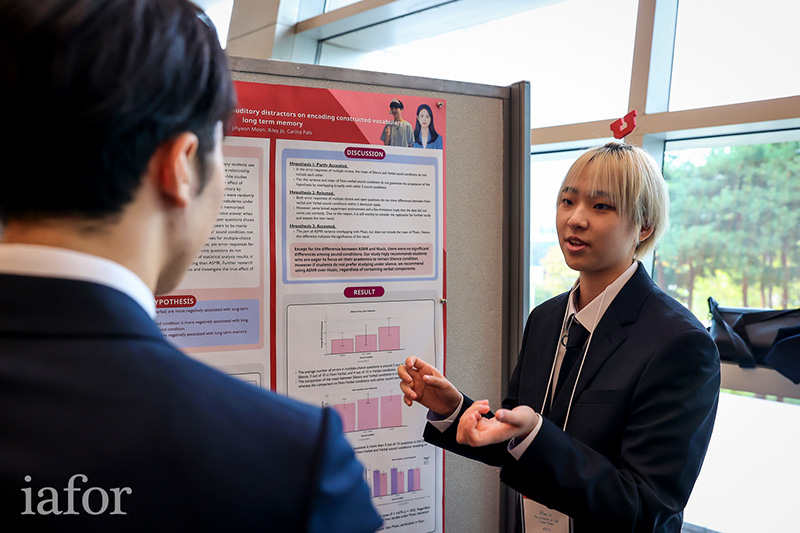
8.1. IURS in Incheon 2024
The Undergraduate Research Symposium in Incheon 2024 was the first undergraduate research symposium IAFOR hosted outside of Japan. Previously the Asian Undergraduate Research Symposium (AURS), IURS expanded the capacity-building programme to facilitate wider international outreach to undergraduate students as an initiative to support the academics of the future.
At IURS in Incheon 2024, we welcomed 25 presenters from South Korea, Japan, the Philippines, and the United Kingdom. Delegates met online prior to the onsite day for initial training on presentation and interpersonal skills, preparing posters presentations for KCE2024. At Songdo ConvensiA, students met with Dr Haldane and Professor Grant Black (Chuo University, Japan) for the final briefing sessions. These sessions included how to connect with other delegates at the conference, pitch their presentations, and networking skills. The Incheon leg of IURS received submissions in the streams of Architecture, Geography and Urban Studies, Sustainability: Ecology, Energy and the Environment; Education, Psychology and the Behavioral Sciences; Ethics, Religion and Philosophy; Science, Technology, Engineering & Math, among others.
After the final briefing sessions, IURS delegates presented their posters to main conference attendees. The IURS Poster Presentation Session was well received, as students were able to deliver their presentations effectively and demonstrated their commitment to their research. Attendees extended their appreciation to the students for having the courage to present at a large professional conference, a frightening feat for first-time conference presenters. To learn more about IURS and its upcoming schedule, please visit the symposium website.
8.2. Poster Presentation Session
The Poster Presentation Session at the Korean Conference Series featured a mix of educational and humanities presentations, offering a platform for presenters to showcase their research and expand their research in an interdisciplinary way. The poster presentation session is designed as a space for both newcomers to the conference as well as ‘seasoned returnees to present their research. The presentations were well-received by conference attendees and featured a wide range of research topics, including cultural integration in education, the application of game theory in higher education evaluation, and even the designing of train station symbols to promote tourism. The poster presentation session offered delegates a chance to learn more about up and coming research in the field and explore new research opportunities through various findings presented during the session. At the end of the session, poster presenters were able to catch up with one another about their presentations, as well as exchanging presentation techniques.
9. Conference Cultural Events & Educational Tours
During the Korean Conference Series, we were able to provide several Conference Cultural Events, including cultural and educational tours in partnership with our Korea Partners. The Conference Cultural Event during the plenaries featured a meditation workshop and how one could practice meditation in daily life. Delegates had a chance to step outside the conference venue and explore Incheon, through a variety of local tour offerings including a tour of the historic Ganghwa Island, the Global Campus Tour, and a visit to the National Museum of World Writing Systems. The tours not only broadened their knowledge about Korea but also offered opportunities for delegates to connect with one another outside the conference venue in more relaxed settings. Creating spaces and itineraries where delegates can make meaningful connections and long-lasting networks makes Cultural Events and Educational Tours important components of IAFOR’s Conference Programming. The tours were arranged in collaboration with the Incheon Tourism Organization and the University of Utah Asia Campus.

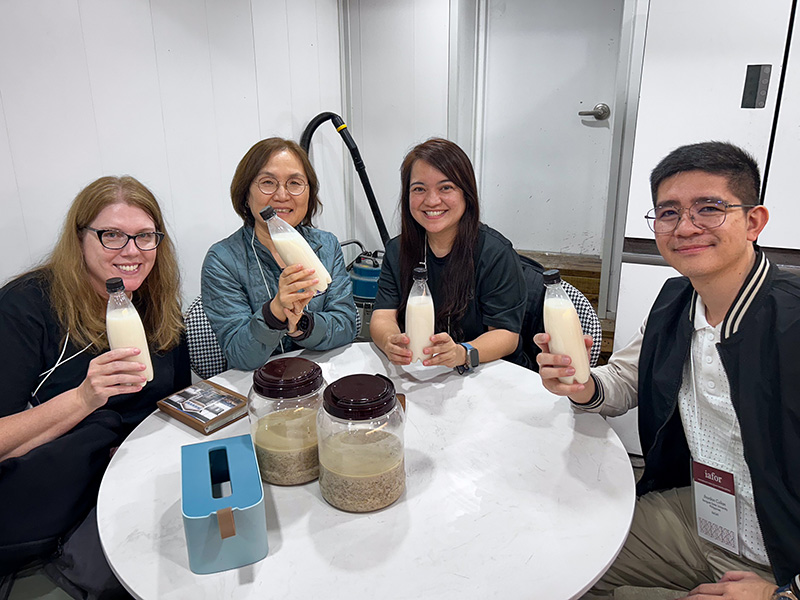
9.1. Cultural Tour of Historic Incheon
The Conference Cultural Tour led participants through Ganghwa Island and some of its famous landmarks. Delegates embarked from Songdo ConvensiA on a two hour drive to Ganghwa Island and were able to see the city of Songdo and the urban development of cities along the way.. The local tour guide gave a historical overview of how Ganghwa was a strategic location for Korea’s ancient capital and was attacked multiple times by outsiders. Besides its strategic importance to Korean history, it is also a place where many cultural heritage sites are situated. Jeondeungsa Temple, the tour’s first stop, is believed to be the first Buddhist temple established in Korea and the entry point of Buddhism on the peninsula. It is believed to have been built in the year 381 during the Joseon Period, explaining the expansion of Buddhism in the subsequent eras throughout Korean history. Much of the temple’s wooden architecture has remained untouched from when it was first built, including its main prayer halls. One highlight is a wooden sculpture believed to depict a ‘naked woman’, carved by a heartbroken carpenter. Inside the temple stands two Ginkgo trees, which are said to be the only pair remaining on the island. Temple visitors can enjoy traditional Ganghwa Herbal Tea, meditation workshops, and a temple stay programme. While our delegates did not participate in the temple stay programme, they had a chance to enjoy the traditional tea as well as the beautiful scenery of the autumn leaves.
After a lunch break, the tour proceeded to Geumpung Brewery, another of Ganghwa Island’s heritage sites. The brewery has been producing Makgeolli, a Korean unrefined rice wine, in the same building since its opening in 1931. Parts of the building have since turned into a learning space for visitors to learn about its history, as well as a workshop space for making Makgeolli. Geumpung Brewery was recently listed as Incheon’s Cultural Heritage in 2022 and is one of the only two Makgeolli breweries in Korea with this honour. Makgeolli has recently gained worldwide popularity through soft power conduits such as K-dramas, resulting in Geumpung Brewery teaming up with a fine dining restaurant in Singapore to distribute its Makgeolli on a global scale as a high-end product of Korea. Delegates experienced Makgeolli brewing first-hand on the tour, learning the traditional method of making Makgeolli including sustainable development initiatives the brewery employs throughout the process. The workshop walked the delegates through how all elements in each process were utilised to their full capacity, gearing toward a zero-waste production process.
9.2. Educational Tours: Bakmun Girls' High School, University of Utah Asia Campus, and The National Museum of World Writing Systems
The educational tour to Bakmun Girls’ High School offered delegates in the education fields and those interested in Korean education to explore the facility and unique curriculum provided by the school. The Bakmin Girls’ High School tour was organised in collaboration with the University of Utah Asia Campus. From its opening in 1940 as Sohwa Girl’s High School, the school relocated in 1956 to Songnim-dong, and again in 2015 to the current location. Delegates were guided through the school’s modern facilities, including the library, shared working space, cafeteria, and recreational area. At the main auditorium, delegates were welcomed by the school’s representative and were briefed on an overview of the school’s operation. The school offers courses not only in STEM but also in Humanities, Social Studies, Media, and Arts Education. The school also offers an ‘Autonomous Self-Exploration Week’ for students to discover themselves, their dreams, and their talents. From observation, the school equips students with educational content and real-life skills through its extracurricular programmes and student-centred clubs. Some of the interesting courses the school offers include Media Literacy, Writing for Real-life Application, and Youth Fact Check.
Another group of delegates visited the National Museum of World Writing Systems, located about a 15-minute walk from Songdo ConvensiA. The museum showcases the evolution of the World’s writing system, including the Hangul, but also the significance writing brings to humanity. Writing systems ‘built a road’ into civilisations, promoting the expansion of trade, culture, religions, laws, and knowledge, building human history. The museum features exhibits displaying the development of 55 languages including significant artefacts and replicas of writing evolution, from Sumerian tablets dating back to 2000 BC and Arabic Scripts, to the Gutenberg Press and modern typewriters. After the tour of the history of writing, delegates also visited a special exhibition ‘L'Olympia Odyssey - Language And Feminism, Expressions in Total Artworks’ with a focus on how women expressed their ideas through letters and artworks. The exhibition shows how women and women artists have expressed their struggles through artworks from the Eastern to the Western Worlds. Featured as the major part of the exhibition is the work of Guerrilla Girls, an anonymous feminist group fighting against racism and sexism within the art world. The end of the exhibition features the world’s famous female figures and their writing, including Angela Merkel, Ruth Bader Ginsburg, and Hannah Arendt.
9.3. Meditation Workshop: Korean Buddhist Education and Meditation
A meditation workshop was integrated into the conference plenaries, led by June Han Sunim, a practising Buddhist monk and co-founder of JustBe Temple in Seoul, South Korea. The workshop was a reflective and deeply personal session, introducing delegates to Zen Buddhist meditation and Han Sunim’s own journey to monkhood. As co-founder of JustBe Temple, the world’s first meditation guesthouse, he shared how mindfulness transformed his life after experiencing trauma, a near-fatal car accident, and the rigour and challenges of monastic training. Through intensive meditation, he learned to focus on the present moment and recognize fears and anxieties as mind-made. Han Sunim emphasised that meditation is not the mere practice of sitting in meditation, but a way of life, where every action can become purposeful and mindful. He spoke about the power of embracing challenges, finding love and peace in both solitude and in connecting with others, and living fully in the moment. His message resonated with educators and professionals, encouraging them to view hardships as teachers and prioritise mental clarity to build inner strength, foster resilience, and inspire their own students naturally through their presence and actions.
10. Conference Networking Events
The Conference Networking Events served as a platform for gathering, providing participants with opportunities to connect in both professional and social settings. The Welcome Reception and the Conference Dinner are offered as spaces to create an engaging and collaborative atmosphere. Attendees were able to exchange ideas, discuss research, and explore potential partnerships in more relaxed, casual spaces. These events, blending formal networking with the warmth of social interaction, highlighted the conference's dedication to fostering international, intercultural, and interdisciplinary collaboration. Together, the networking events not only enhanced the overall experience but also laid the foundation for enduring connections among delegates.
10.1. Welcome Reception
The welcome reception was held at the conference venue, Songdo ConvensiA, after the first day of the plenary programme. The reception was open to all registered delegates, which offered a great opportunity for all participating members to make connections with one another in a relaxing atmosphere during the conference. The plenary speakers also attended the reception, offering delegates a chance to speak to them more about their presentations, as well as potential future collaborations. Some delegates shared their excitement about being in Korea for the first time, whereas others talked about attending each others’ presentations or making dinner plans. We take pride in creating a conference environment that fosters networking, as well as space for presenting research, providing an ideal setting to bring international, intercultural, and interdisciplinary collaboration to life.
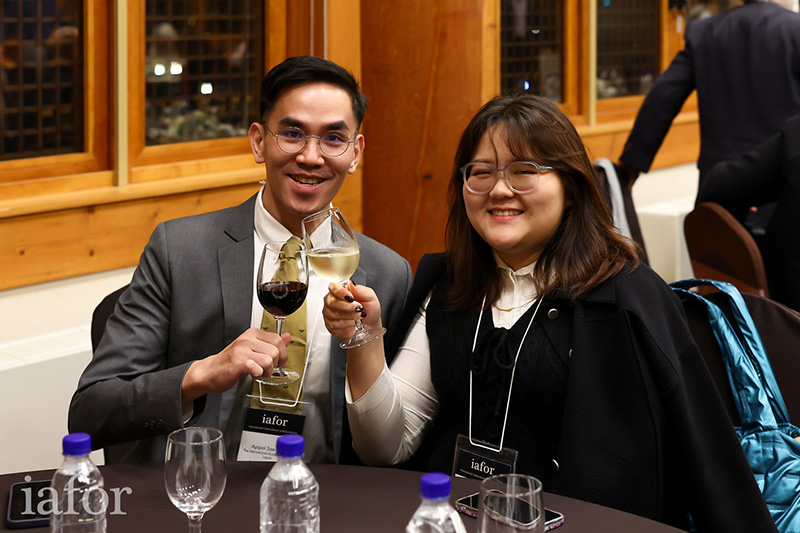
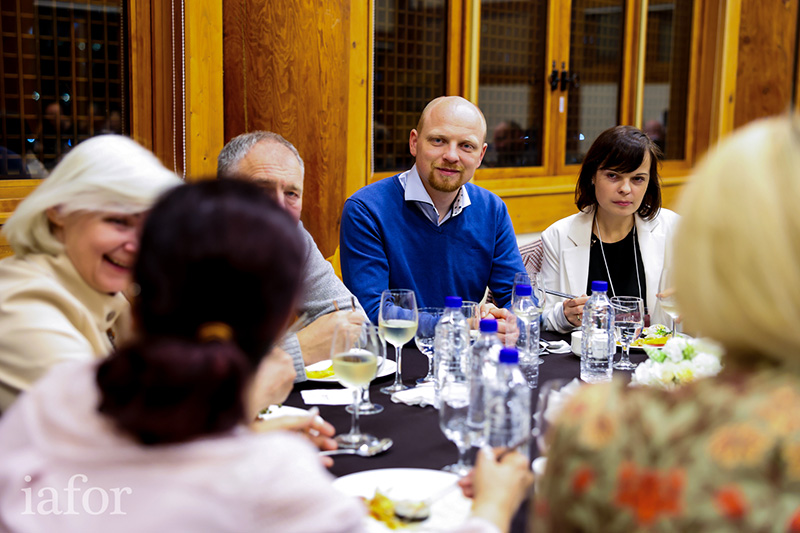
10.2. Conference Dinner
The Conference Dinner for the Korean Conference Series took place at Gyeongwonjae Ambassador Incheon, where the magnificent Korean traditional architecture contrasted beautifully with the vibrant modern landscape of Incheon. With the blend of traditional Korean cuisine and a mix of Asian and Western flavours, delegates were able to enjoy their exclusive time together with the plenary speakers, IAFOR Executives, and VIP guests from the University of Utah Asia Campus. The Conference Dinner offers a chance for a more in-depth conversation among the participants, fostering countless possibilities for collaboration. IAFOR Conference Dinners are always held at spectacular venues, offering high-quality dining, unique cultural experiences, and a welcoming platform for attendees to connect. This ticketed event always sells out quickly, so please keep an eye on it when registering for the conference!
Subscribe and Stay Informed
Receive key insights directly to your inbox.
Stay informed of the latest developments in academia.
100% free to read, download and share.

KCE/KCAH2024 Key Statistics
Delegate World Map & Country Breakdown
Total Number of Attendees: 364
Total Number of Countries Represented: 55
| Country | Count |
|---|---|
| South Korea | 67 |
| Indonesia | 53 |
| Philippines | 42 |
| United States | 33 |
| Japan | 17 |
| Thailand | 11 |
| Hong Kong | 9 |
| Taiwan | 9 |
| South Africa | 7 |
| India | 6 |
| Malaysia | 6 |
| United Arab Emirates | 6 |
| United Kingdom | 6 |
| Australia | 5 |
| Brunei | 5 |
| China | 5 |
| Canada | 4 |
| Lithuania | 4 |
| Maldives | 4 |
| Singapore | 4 |
| Turkey | 4 |
| Uzbekistan | 4 |
| Vietnam | 4 |
| Iran | 3 |
| Israel | 3 |
| Kuwait | 3 |
| Slovakia | 3 |
| Georgia | 2 |
| Country | Count |
|---|---|
| Germany | 2 |
| Italy | 2 |
| New Zealand | 2 |
| Nigeria | 2 |
| Oman | 2 |
| Poland | 2 |
| Austria | 1 |
| Bangladesh | 1 |
| Ecuador | 1 |
| Finland | 1 |
| Ghana | 1 |
| Greece | 1 |
| Kazakhstan | 1 |
| Malta | 1 |
| Mexico | 1 |
| Myanmar | 1 |
| Netherlands | 1 |
| Norway | 1 |
| Portugal | 1 |
| Qatar | 1 |
| Romania | 1 |
| Saudi Arabia | 1 |
| Spain | 1 |
| Sudan | 1 |
| Switzerland | 1 |
| Tanzania | 1 |
| Ukraine | 1 |
Subscribe and Stay Informed
Receive key insights directly to your inbox.
Stay informed of the latest developments in academia.
100% free to read, download and share.


